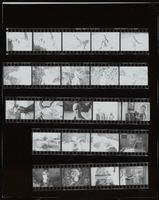Search the Special Collections and Archives Portal
Search Results
Cathy Scott oral history interview
Identifier
Abstract
Oral history interview with Cathy Scott conducted by Dennis McBride on December 12, 2006 for the Las Vegas Gay, Lesbian, Bisexual and Transgender Archives Oral History Project. In this interview, Scott discusses reporting about the murder of Roger Jameson, a gay man who was found dead outside of a gay bar in Las Vegas, Nevada on April 25, 1995. Scott describes the scene upon her arrival and her initial reactions to the homicide. She talks about the issue of homophobia in Las Vegas at the time and explains that other newspaper publications would not want to cover this story because this was not seen as a serious issue. Lastly, Scott talks about the double life that Jameson lived and how the public reacted to his story.
Archival Collection
Sarah Serna oral history interview
Identifier
Abstract
Oral history interview with Sarah Serna conducted by Dennis McBride on December 04, 1998 for the Las Vegas Gay, Lesbian, Bisexual and Transgender Archives Oral History Project. Serna opens her interview by discussing her move to Las Vegas, Nevada in 1993, and her first assignment as a Methodist minister to a small congregation in North Las Vegas. Serna then explains how she became involved in LGBT social justice issues after witnessing expressions of homophobia and prejudice within her church. She discusses her involvement with the Las Vegas LGBT community and the development of a pastoral care outreach program, the development of the World AIDS Day prayer vigil, and the foundation of the Community Counseling Center, later renamed Lighthouse Ministry. Serna then talks about her decision to transition from the Methodist Church to the Episcopalian Church and becoming the first Episcopalian priest in Las Vegas to bless same-sex marriages. She also discusses the development of a transitional housing program, changes in the LGBT community in Las Vegas, and many individuals involved in LGBT social justice programs in Las Vegas.
Archival Collection
Navajo Uranium Workers Oral History and Photograph Project, 1999 summer
Level of Description
Archival Collection
Pagination
- Previous page ‹‹
- Page 5
Archival Component
Nevada Women's History Project customized print woven blanket, undated
Level of Description
Archival Collection
Pagination
- Previous page ‹‹
- Page 5
Archival Component
Louis Wiener, Jr. oral history project correspondence and transcript, 1990
Level of Description
Archival Collection
Pagination
- Previous page ‹‹
- Page 5
Archival Component
Lori Lipman Brown oral history interview
Identifier
Abstract
Oral history interview with Lori Lipman Brown conducted by Dennis McBride on September 12, 2005 for the Las Vegas Gay, Lesbian, Bisexual and Transgender Archives Oral History Project. In this interview, Brown discusses Question 2 in the Nevada state elections of 2000 and 2002, which added an amendment to the Nevada constitution that banned same-sex marriage. Brown describes the process of introducing legislation that advocated for equal rights for the gay community and an incident where parties opposing her efforts hired a spy to observe her work. Lastly, Brown talks about the involvement of the Church of Latter-Day Saints and their opposition to same-sex marriage.
Archival Collection
Memorabilia gifted to Tabach from oral history projects, 2017 to 2020
Level of Description
Archival Collection
Pagination
- Previous page ‹‹
- Page 5
Archival Component
David Parks oral history interview
Identifier
Abstract
Oral history interview with David Parks conducted by Dennis McBride on January 31, 2007 for the Las Vegas Gay, Lesbian, Bisexual and Transgender Archives Oral History Project. In this interview, Parks, a member of the Nevada senate, discusses working on a Nevada anti-bullying bill and a family fairness bill, which stated that any two persons could have another person as a recipient beneficiary. Park describes dealing with opposition to the family fairness bill with some people arguing that it changes the traditional definition of family. Parks recalls running against a man with a similar name, David F. Parks, in a 2002 legislative assembly election.
Archival Collection
Vegas PBS Interviews for the African Americans in Las Vegas: a Collaborative Oral History Project
Identifier
Abstract
Oral history interviews with Ruby Amie Pilot, Eva G. Simmons, Melvin Sanders, Jarmilla McMillan-Arnold, Hannah Brown, Sonny Thomas, and Claytee White conducted by Vegas PBS on April 01, 2013, April 02, 2013, April 12, 2013, and November 19, 2013 for the African Americans in Las Vegas: a Collaborative Oral History Project. In these interviews, the participants discuss their early lives and moving to Las Vegas, Nevada. Pilot talks about segregation on the Las Vegas Strip, integration, and the importance of church activities in the African American community. Simmons describes her career as a teacher, the schools on the Westside, and businesses on Jackson Street. Thomas describes the funeral industry and his role as a funeral director. McMillan-Arnold talks about segregated Las Vegas, African American entertainers, and the issue of homelessness on the Westside. Brown remembers growing up on the Westside, segregated schools, and her role as President of the National Coalition of 100 Black Women – Las Vegas chapter. Lastly, Sanders discusses his childhood in Las Vegas, being the son of a preacher, and the redevelopment of the Westside.
Archival Collection

